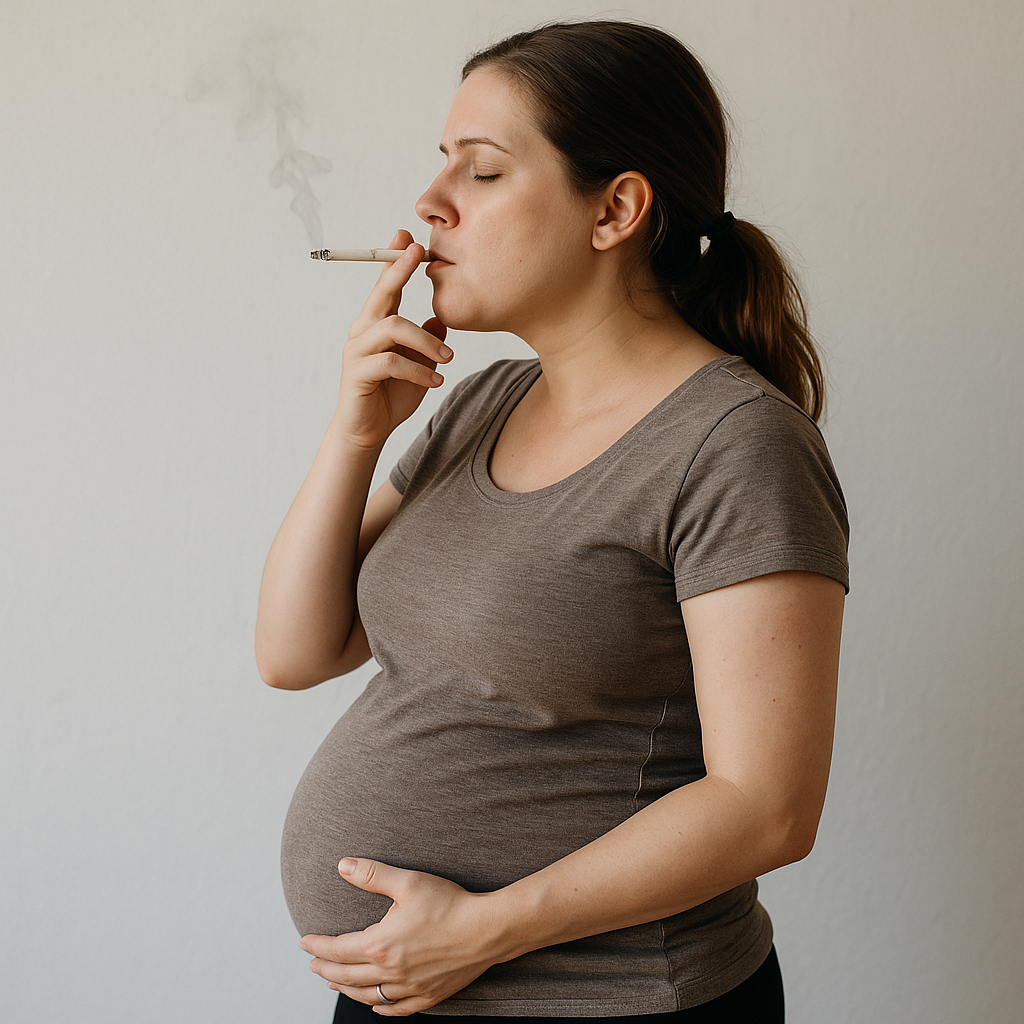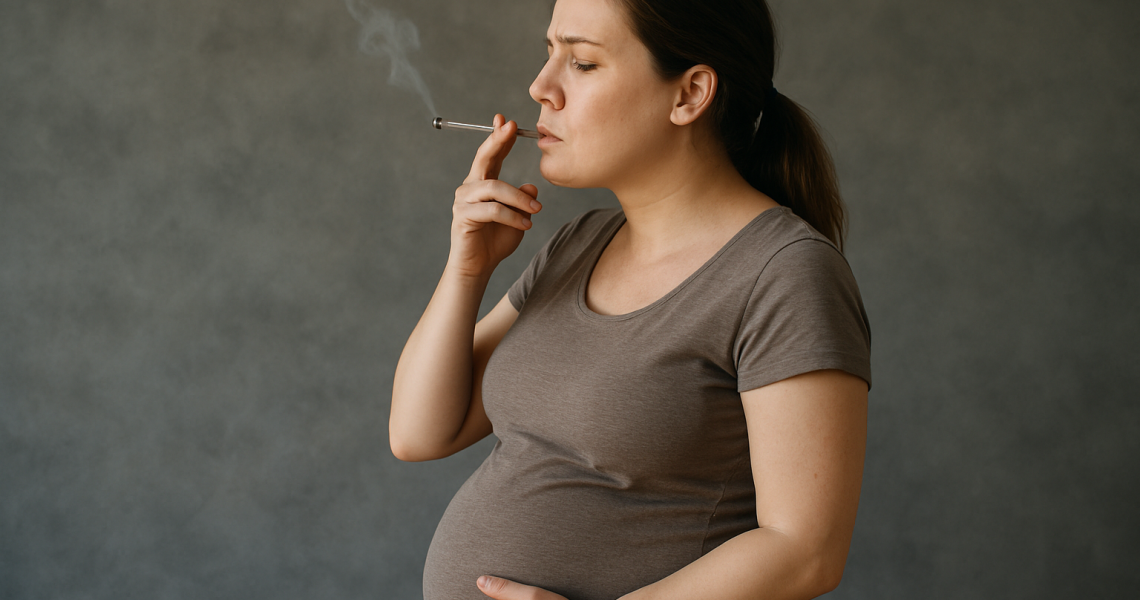Tobacco is recognized as a major health risk factor, particularly for pregnant women. Every year, thousands of expectant mothers continue to smoke, sometimes without fully appreciating the dangers this represents for their pregnancy and their baby. Among the most worrying risks, that of early miscarriage is widely documented by scientific studies.
In France, nearly 17% of pregnant women still smoke in the first trimester of pregnancy, according to Santé Publique France. Yet smoking during this critical period considerably increases the risk of spontaneous miscarriage, sometimes as early as the very first weeks of gestation. The toxic substances contained in cigarettes – notably nicotine, carbon monoxide and other chemical compounds – directly affect embryonic development and the proper implantation of the embryo in the uterus.
In this article, we analyze how tobacco influences the risk of early miscarriage, what biological mechanisms are involved, and above all, what solutions exist for expectant mothers wishing to preserve their pregnancy and put an end to their tobacco addiction.

How does smoking affect early pregnancy?
A direct impact on fertility and embryonic implantation
Tobacco not only affects pregnancy itself, but also the ability to conceive. Numerous studies show that smokers take twice as long to get pregnant as non-smokers, as nicotine alters egg quality and reduces ovarian reserve.
Once fertilization has taken place, the embryo must implant itself in the uterus to begin its development. However, smoking disrupts this essential process by reducing blood flow to the uterus, thus compromising implantation. The toxic substances in cigarettes also cause inflammation of the endometrium, making the uterine environment less favorable for embryo attachment.
What’s more, studies have shown that nicotine and carbon monoxide can damage the DNA of embryonic cells, increasing the risk of chromosomal abnormalities that can lead to early miscarriage.
The role of carbon monoxide and nicotine in miscarriages
Carbon monoxide is one of the main poisons in cigarette smoke. This toxic gas takes the place of oxygen in the bloodstream, preventing proper oxygenation of the fetus. Embryonic development depends directly on a sufficient supply of oxygen. A deficiency can lead to fetal hypoxia, i.e. oxygen deprivation, which causes developmental abnormalities and increases the risk of spontaneous pregnancy termination.
Nicotine is a powerful vasoconstrictor, reducing the diameter of blood vessels and thus limiting exchanges between mother and embryo. Poor blood circulation in the placenta results in stunted growth and can compromise fetal survival from the very first weeks.
Alarming figures on smoking and miscarriages
Increased risk from the very first cigarette
The scientific evidence is clear: the more a woman smokes, the greater the risk of miscarriage. According to a study published in the journal Human Reproduction, women who smoke more than 10 cigarettes a day have a risk of miscarriage multiplied by 2, and even more if other risk factors are present (age, alcohol consumption, medical history).
Even low tobacco consumption is not without danger. A study conducted byInserm reveals that smoking less than five cigarettes a day already increases the risk of miscarriage by 25% compared with non-smokers. This is because cigarette toxins accumulate in the body, affecting the health of the fetus from the very first days of pregnancy.
This article may be of interest to you: Why go into the field of anti-tobacco and addiction laser training?
Exposure to passive smoking: an underestimated danger
Exposure to passive smoking: an underestimated danger
Even pregnant women who don’t smoke directly can be affected by exposure to passive smoking, a factor often underestimated but just as harmful as active consumption. Involuntary inhalation of cigarette smoke, whether at home, at work or in public places, increases the level of carbon monoxide and nicotine in the blood, reducing the oxygen supply to the fetus.
A survey conducted in France indicates that women regularly exposed to cigarette smoke have a 23% increased risk of miscarriage, even if they are not smokers themselves. Toxic particles in ambient air can cross the placenta and affect embryonic development, increasing the risk of complications such as in utero growth retardation, premature birth and even spontaneous termination of pregnancy.
Studies have also shown that passive smoking can cause placental anomalies, reducing the quality of exchanges between mother and baby. Pregnant women living with a smoking partner are particularly vulnerable: according to the WHO, the risk of miscarriage increases by 11% when the father smokes at home.
To limit this exposure, it’ s essential that those around you are aware of the risks and adopt responsible behavior by avoiding smoking in the presence of a pregnant woman, frequently airing rooms and promoting a smoke-free environment.

Stop smoking to protect your pregnancy
Immediate cessation: benefits from the very first weeks
The good news is that the negative effects of smoking can be rapidly reversed after cessation. Within the first few weeks of weaning, carbon monoxide levels in the blood drop considerably, allowing better oxygenation of the fetus. In just a few days, blood circulation improves, reducing the risk of complications linked to poor placental vascularization.
The benefits accumulate rapidly: after a week’s cessation, the mother’s heart rate and blood pressure gradually return to normal, limiting the risk of preeclampsia and early miscarriage. After a month without tobacco, nicotine levels are completely eliminated from the body, enabling better absorption of nutrients essential for the baby’s development.
Studies show that pregnant women who stop smoking early in pregnancy halve their risk of miscarriage compared with those who continue. Even in the case of late cessation, the beneficial effects are immediate: fetal oxygenation improves, the placenta functions better, and the chances of a full-term pregnancy increase significantly.
It is therefore essential not to minimize the positive impact of stopping, whatever the stage of pregnancy. Mothers-to-be shouldn’t hesitate to ask for help, as solutions exist to accompany this change without stress or anxiety.
Weaning methods for pregnant women
Quitting smoking during pregnancy is essential, but can be a real challenge because of the physical and psychological dependence on nicotine. Fortunately, there are a number of methods available to help mothers-to-be achieve effective weaning without risk to the baby.
Nicotine substitutes, such as patches or gums, can be prescribed under strict medical supervision. Although they provide nicotine, they prevent inhalation of the toxic substances contained in cigarette smoke. However, their use must be monitored, as doses must be adapted to each individual woman to limit exposure of the foetus.
Among nicotine-free solutions, laser auriculotherapy is a natural alternative that is gaining in popularity. By stimulating certain reflex points in the ear, this technique helps reduce cravings and ease withdrawal symptoms. Unlike drug substitutes, it has no side-effects and is ideally suited to pregnant women concerned about their own and their baby’s well-being.
Other approaches, such as behavioral therapy, hypnosis or support from specialized groups, canhelp you deal with the emotional aspects of quitting smoking. Medical and psychological support is often recommended, as giving up smoking can be a source of stress, which can also have an impact on pregnancy.
It’s vital that every mother-to-be finds the right method to help her quit smoking safely and sustainably. The aim is to preserve the baby’s health while guaranteeing optimum well-being for the mother.
Essential medical and psychological support
Quitting smoking can be difficult, especially during pregnancy, when emotions are heightened. With the help of a doctor, midwife or tobaccologist, we can tailor the treatment to each woman’s specific needs.
In addition, joining support groups, following smoking prevention programs or consulting a specialist in hypnosis or behavioral therapy can be invaluable.
Conclusion
The link between smoking and early miscarriage is now clearly established. Cigarette smoking during pregnancy compromises embryonic implantation, reduces fetal oxygenation and doubles the risk of spontaneous abortion. Even low consumption is dangerous, and exposure to passive smoking should not be overlooked.
However, it’s never too late to quit smoking and protect your pregnancy. Many solutions exist, such as the auriculotherapy laser method, which offers a natural, risk-free approach to helping pregnant women free themselves from tobacco.
Making the decision to stop means offering your child a healthy environment right from the start.
If you want to stop smoking now, visit one of our laser centers and say STOP smoking.
